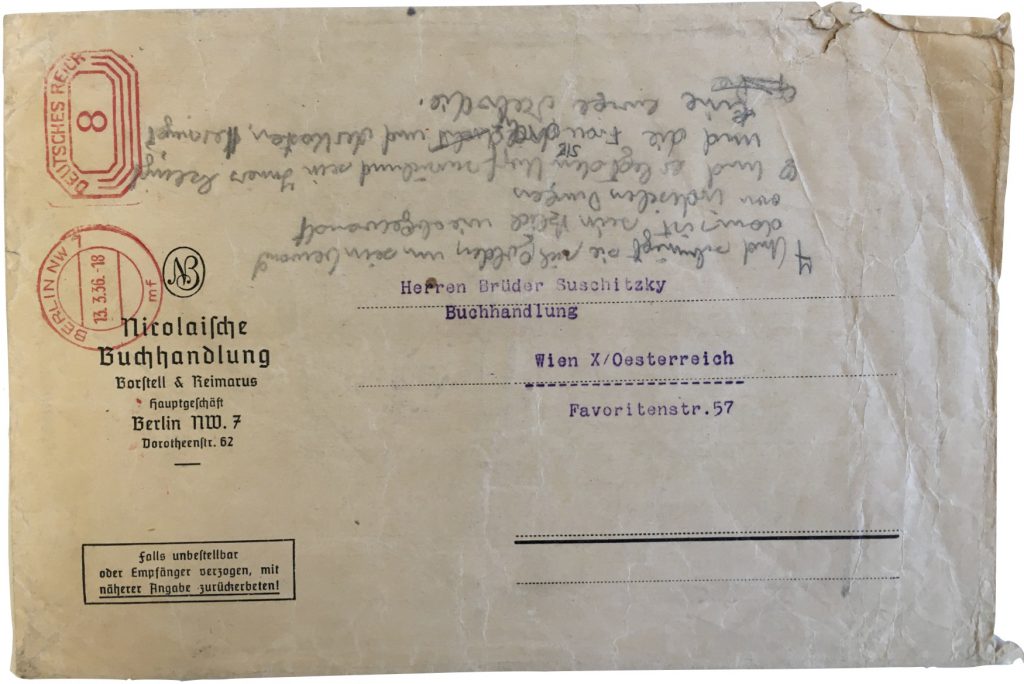Tom Waibel
Es gibt eine Erzählung aus der Zeit um Amos Vogels Bar Mizwa im Jahr 1934: Sein Vater hatte ihm einen Freibrief gegeben, mit ihm in eine Buchhandlung zu gehen, um sich verbotene Bücher auszusuchen. Vogel erzählt später, dass er in einem öffentlich nicht zugänglichen Raum hinter einem Vorhang ohne Einschränkung 12 Bücher auswählen durfte.
Im Laufe der Aufarbeitung der Amos Vogel Library sind wir auf dieses Briefkuvert gestoßen, das ein interessantes Indiz dafür liefert, dass die Auswahl der verbotenen Bücher in der Buchhandlung Suschitzky im 10 Wiener Gemeindebezirk stattgefunden haben könnte.
Das Kuvert ist an die Herren Brüder Suschitzky, Buchhandlung Wien X/Österreich, Favoritenstr. 57 gerichtet und wurde von der Nicolaischen Buchhandlung in Berlin am 13.3.1936 abgeschickt. Die Tatsache, dass sich dieses Kuvert im Nachlass von Amos Vogel findet, ist mindestens so erstaunlich wie der Umstand, dass Vogel das Kuvert zur Niederschrift einiger Gedichtzeilen nutzt:
7 Und schwingt sie sich golden um sein Gewand
damit ist sein Blick wie abgewandt
von irdischen Dingen
8 Und er legt den Kopf zurück und sein Inneres klingt
und die Frau sie dreht und der Kasten er singt
eine ewige Melodie.
Welche 12 Bücher sich Amos Vogel damals ausgesucht hat, lässt sich heute nicht mehr mit Gewissheit feststellen, aber es sagt viel über die politische Haltung der Eltern aus, dass sie ihren Sohn kurz nach dem Februar-Aufstand 1934 in Wiens berüchtigte Spezialbuchhandlung für sozialistische Literatur mitnehmen. Während im Geschäft Schriften über Freidenkertum, soziale Fragen und die Frauenbewegung verkauft werden, geht es hinter dem Vorhang noch radikaler zu. Mit Titeln wie Reif zur Liebe und Wollt Ihr Kinder? setzt sich die Buchhandlung für Aufklärung und Abtreibung ein und landet damit vor Gericht. Aber auch sogenannte kommunistische Druckwerke sind Mitte der 30er Jahre bereits verboten.
1938 muss die Buchhandlung Suschitzky für immer schließen und die Vogelbaums emigrieren in letzter Sekunde nach New York. Wolf Suschitzky, der Sohn der Buchhändler, emigriert nach England, wo er als Kameramann und Fotograf berühmt wurde. Amos Vogel und Wolf Suschitzky begegnen sich im Rahmen des Filmexil-Symposiums Aufbruch ins Ungewisse in Wien 1993 wieder.

There is a story from the time around Amos Vogel’s bar mitzvah in 1934: His father had given him carte blanche to go with him to a bookstore to choose forbidden books. Vogel later relates that he was allowed to choose 12 books without restriction in a room behind a curtain that was not open to the public.
In the course of our research on the Amos Vogel Library, we came across this envelope, which provides an interesting indication that the selection of the banned books may have taken place at the Suschitzky bookstore in Vienna’s 10th district.
The envelope is addressed to the Suschitzky Brothers, Bookshop Vienna X/Austria, Favoritenstr. 57 and was sent by the Nicolaische Buchhandlung in Berlin on 13.3.1936. The fact that this envelope is found in the estate of Amos Vogel is at least as astonishing as the fact that Vogel uses the envelope to write down some lines of poetry:
7 And she sways golden around his robe
so that his look is like turned away
from earthly things
8 And he puts his head back and his inside resonates
and the woman turns and the box is singing
an eternal melody.
Which 12 books Amos Vogel chose at the time cannot be determined with certainty today, but it tells us a lot about his parents’ political stance that they took their son to Vienna’s notorious special bookstore for socialist literature shortly after the February uprising in 1934. While the store sells writings on freethinking, social issues and the women’s movement, things are even more radical behind the curtain. With titles such as Ripe for Love and Do You Want Children?, the bookstore advocated sex education and abortion, which ended up in court. But even so-called communist publications were already banned in the mid-1930s.
In 1938, the Suschitzky bookstore had to close forever and the Vogelbaums emigrated to New York at the last minute. Wolf Suschitzky, the booksellers’ son, emigrates to England, where he becomes famous as a cameraman and photographer. Amos Vogel and Wolf Suschitzky meet again at the Filmexile Symposium Departure into Uncertainty in Vienna in 1993.